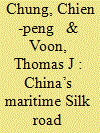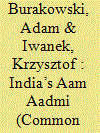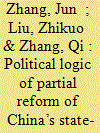| Srl | Item |
| 1 |
ID:
152981


|
|
|
|
|
| Summary/Abstract |
This article focuses on China’s Maritime Silk Road initiative, paying particular attention to Southeast Asia, the initiative’s key focus. It examines the political and economic costs and benefits of participation in the initiative for Southeast Asian countries, and identifies the rationales that may enhance or diminish the initiative’s success.
|
|
|
|
|
|
|
|
|
|
|
|
|
|
|
|
| 2 |
ID:
152982


|
|
|
|
|
| Summary/Abstract |
The Chinese government inspects villages to encourage economic development and foster income equality. It is thus more likely to inspect model villages, villages hosting investments, and poorer villages. Empirical tests with data from 961 Chinese villages confirm these propositions. Villages with investments and villages with poverty attract the most inspections.
|
|
|
|
|
|
|
|
|
|
|
|
|
|
|
|
| 3 |
ID:
152985


|
|
|
|
|
| Summary/Abstract |
The Aam Aadmi Party (Common Man’s Party, AAP) has taken over part of the program of the Indian National Congress. The AAP was able to include new solutions within the traditional political repertoire. In Delhi the AAP took over the traditional Congress electorate but was also able to reach out to the middle-class voter.
|
|
|
|
|
|
|
|
|
|
|
|
|
|
|
|
| 4 |
ID:
152984


|
|
|
|
|
| Summary/Abstract |
By examining the origins of Macao’s 2014 protest against the Retirement Package Bill, this paper intends to answer whether Macao is encountering a governance crisis like Hong Kong’s. Through a careful comparison, it concludes that Macao and Hong Kong are unlikely to follow the same political development trajectory, as there are considerable differences in the level of social mobilization and governmental coercive capacity between the two cities.
|
|
|
|
|
|
|
|
|
|
|
|
|
|
|
|
| 5 |
ID:
152980


|
|
|
|
|
| Summary/Abstract |
By exploring the composition of the Chinese Communisty Party’s Central Committee since the 1990s, we analyze why state-owned enterprises reform has fallen into a partial reform equilibrium. We argue that two hypotheses, the interest group hypothesis and the adaptive power-sharing hypothesis, should be combined to fully comprehend the partial reform equilibrium symptom.
|
|
|
|
|
|
|
|
|
|
|
|
|
|
|
|
| 6 |
ID:
152983


|
|
|
|
|
| Summary/Abstract |
To repress growing regional/national identity in Taiwan, China applies rationalist strategies, including economic incentives and military threats. Analysis of the Taiwan National Security Survey in 2003–2015 shows that China’s carrot and stick policies negatively correlate with exclusive Taiwanese identity. In younger generations, perception of the strength of the policies is similar, but their effect on identity is weaker.
|
|
|
|
|
|
|
|
|
|
|
|
|
|
|
|